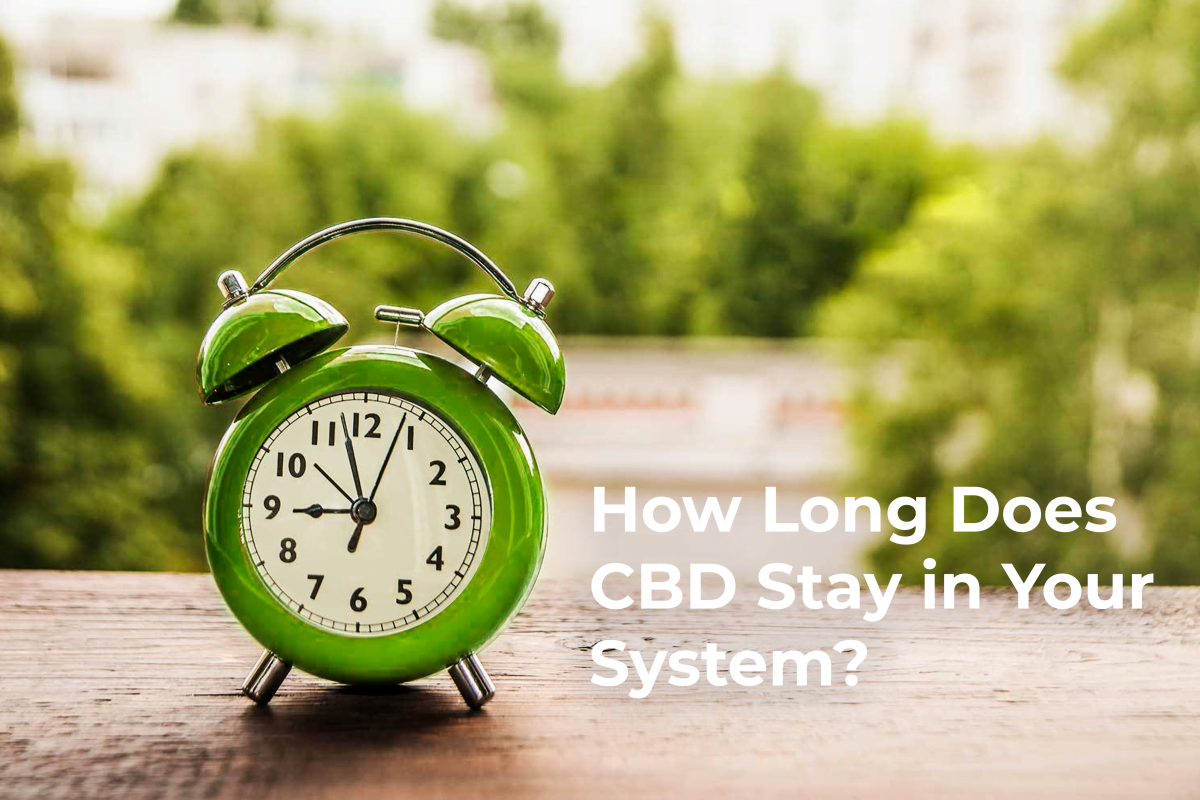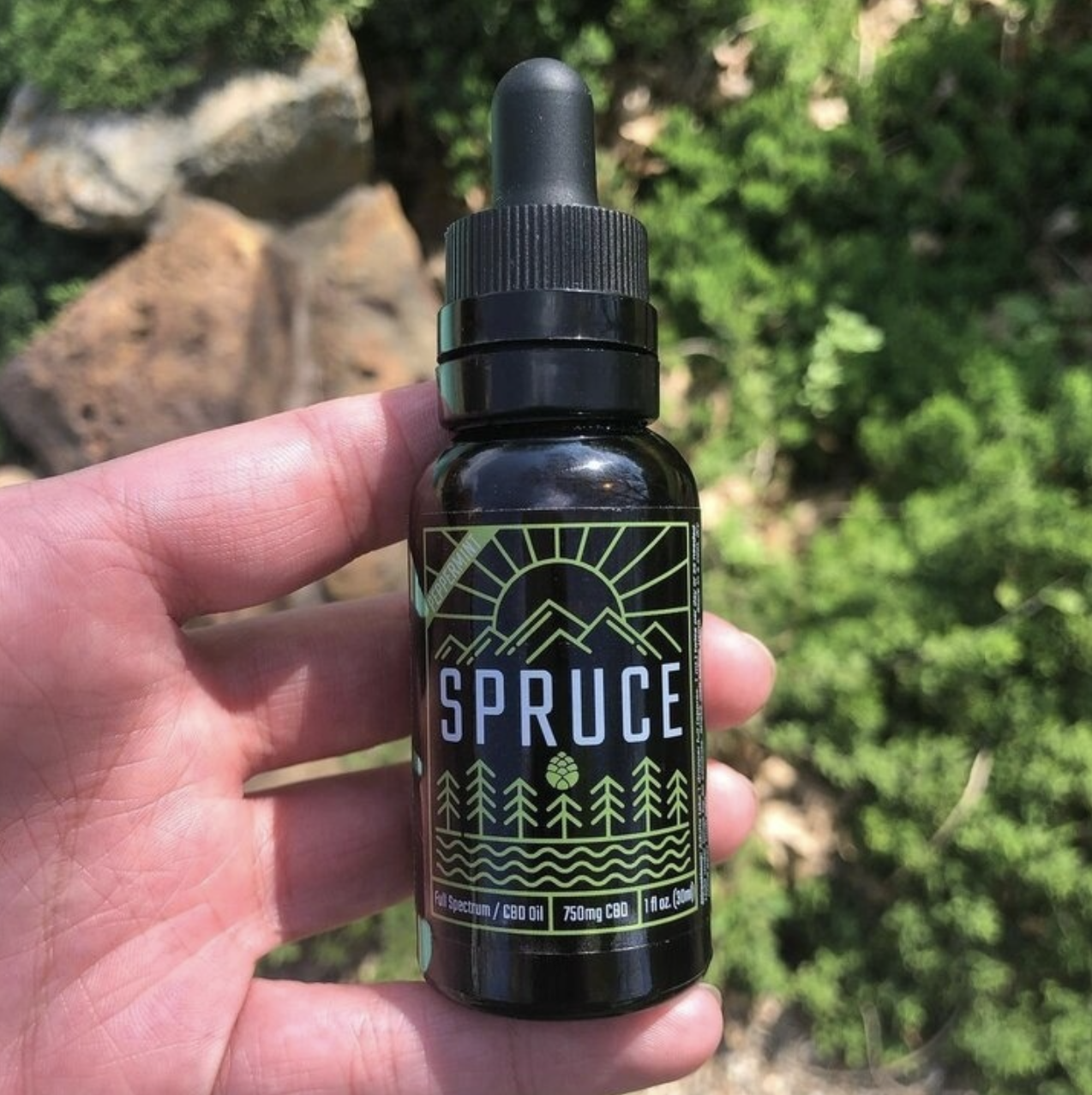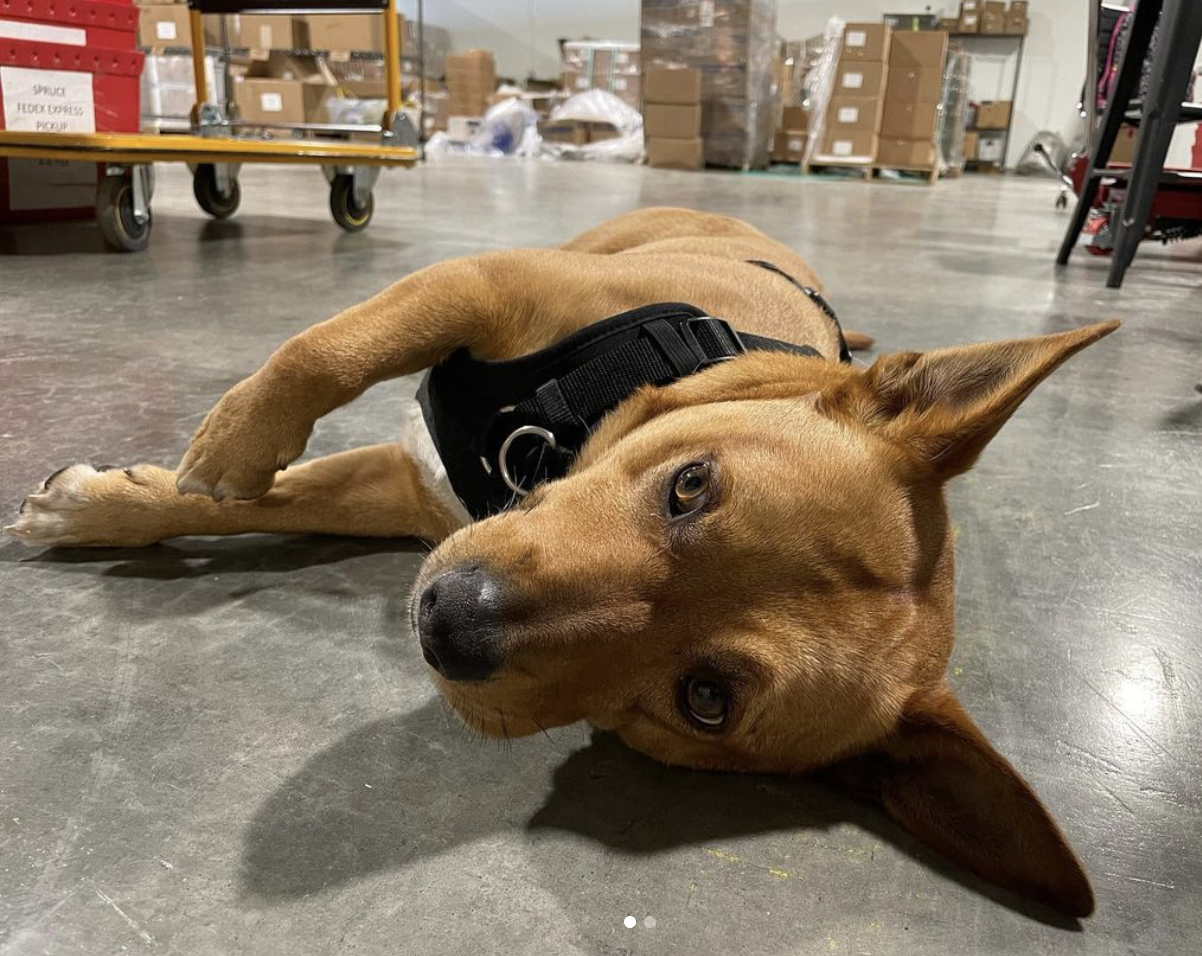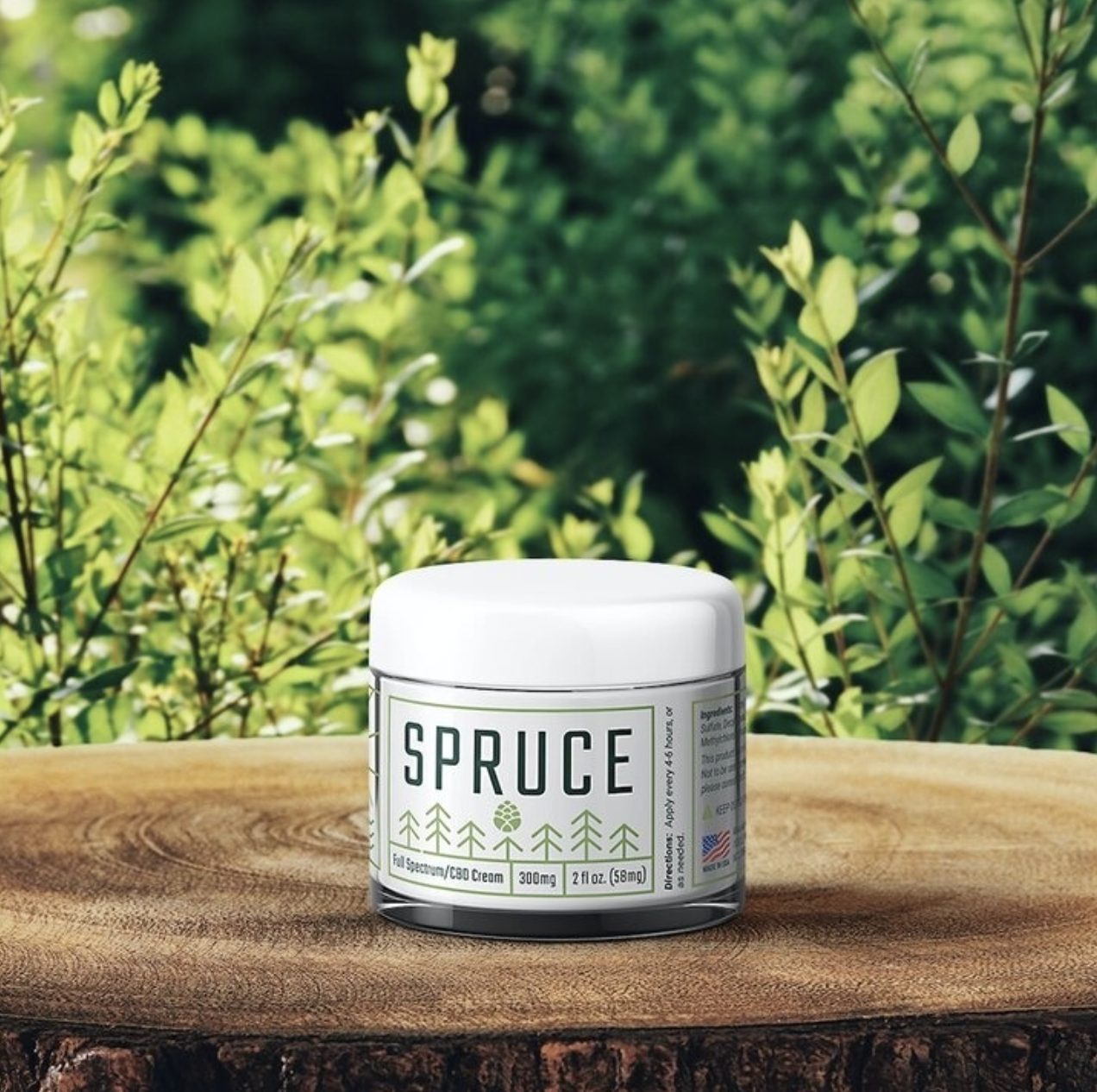How Long Does CBD Stay in Your System? 7 Impacting Factors

How long does CBD stay in your system? The answer depends on how you take it, the potency of the product, how much and how often you take CBD, your body size and metabolism, when and what you eat, and whether or not you take medications that affect the absorption of CBD.
These factors dictate whether CBD remains in your system for mere hours, as long as a month, or somewhere in between.
How Long CBD Stays in Your System: 7 Affecting Factors
In theory, CBD taken orally should be eliminated from the body within 10-30 days. This is because ingested CBD has a half-life of 2-5 days, which means that half of the original concentration will be eliminated within that time frame.
After another couple of days, the amount will again be reduced to half, and so on. After four or five cycles, the compound is removed from the body entirely.
The problem, however, is that numerous factors impact CBD’s half-life, as you’ll see below, and thus how long CBD stays in your system varies greatly.
1. Method of Use
CBD is available in many forms. You can eat CBD gummies, take CBD oil sublingually, inhale CBD, add CBD oil to drinks, use CBD topically, and more. How you choose to take CBD has a significant impact on how long it remains in your system.
Generally, CBD taken sublingually remains in the body for a longer period than when using other methods because it is absorbed directly into the bloodstream. Inhaled CBD might work more quickly than other methods, but it doesn’t remain in the body as long.
2. Potency of the Product
Different CBD products vary widely in potency. Some products contain very little CBD per dose, as little as 1 milligram, but others can deliver 200 mg or more per dose.
The more potent your CBD is, the longer you can expect it to remain in your system because your body has more CBD to process and eliminate.
3. CBD Dosage
Currently, there are no strict dosage guidelines in place for taking CBD. Many users start with the product’s recommended dose and then adjust the dosage until they find what works best for them.
Because overdosing on CBD is not likely possible, experimenting is fine, within reason, and often encouraged by the makers of CBD products. Obviously, taking high concentrations of CBD per dose will cause it to remain in your body for longer periods.
4. How Often You Use CBD
Using CBD only occasionally at low doses won’t result in an accumulation of it within your body, so it will be eliminated from your system relatively quickly. However, with consistent use, CBD does build up within the body.
This is because CBD binds to CB1 and CB2 receptors of the endocannabinoid system. When you maintain consistent levels of CBD in your bloodstream, there is plenty of CBD available to bind to these receptors continuously. This results in CBD remaining active in your system for a significant amount of time.
Additionally, CBD is fat-soluble, meaning that, when taken consistently, it accumulates in the body’s fatty tissues before being slowly released back into the bloodstream.
5. Your Body
How tall you are, how much you weigh, your metabolism, your liver function, the health of your endocannabinoid system, your body’s water content, your muscle mass, your sex, and your age—all of these can have a significant impact on how long CBD stays in your system.
Of these factors, your metabolism is thought to play the largest role in determining how long CBD stays in your system.
Everyone has a different metabolism rate. Those with a fast metabolism tend to break down compounds quickly for elimination. For these individuals, the effects of CBD might be shorter in duration compared to those with slower metabolisms, and their bodies will eliminate CBD faster as well.
6. When and What You Eat
Taking CBD oil with food increases its absorption rate and effectiveness. When you take CBD orally on an empty stomach, your digestive juices start breaking down the compound right away, which reduces its bioavailability, so the effects might not be very potent, and it will be eliminated from the body faster than if you were to take CBD during or after a meal.
Because CBD is fat-soluble, taking CBD after consuming a meal high in fats increases the bioavailability and absorption of CBD, resulting in more CBD circulating in the bloodstream, longer-lasting effects, and slower elimination from the body.
Consider taking your CBD with meals featuring healthy fats, such as those found in avocado, cheese, nuts, eggs, peanut butter, extra-virgin olive oil, and fatty fish.
7. Medications
One of the liver’s many jobs is to break down substances found in CBD, supplements, and medications. However, the speed at which your liver enzymes work can be either increased or decreased by certain medications. While this might seem inconsequential, it can greatly impact the effectiveness and elimination rate of CBD.
In the same way, CBD can also impact the absorption and effectiveness of some medications, so be sure to discuss your plans to use CBD with your doctor to avoid unwanted interactions.
Forms of CBD
CBD products are made using one of three forms of CBD: full-spectrum CBD, broad-spectrum CBD, or CBD isolate. They are similar in that they all contain CBD, but their compound profiles differ, which impacts their effectiveness.
To obtain CBD, hemp plants are dried, and compounds are removed through an extraction process, typically alcohol extraction or supercritical CO₂ extraction. This extraction process results in full-spectrum CBD.
Also known as whole-plant extract, full-spectrum CBD contains all the cannabinoids, terpenes, flavonoids, and beneficial compounds that naturally occur within the hemp plant. Nothing is removed, so this form contains trace amounts of THC (0.3% or less).
Broad-spectrum CBD also contains the hemp plant’s full compound profile, but the THC is carefully removed. Even without the THC, broad-spectrum CBD is still considered to be quite effective and is an ideal option for anyone wanting to avoid THC.
CBD isolate is pure CBD—all of the other cannabinoids, terpenes, and other compounds have been removed.
Even though CBD isolate is pure CBD, it’s not considered to be very useful because studies have shown that the effectiveness of CBD is greatly increased when all of the original compounds are present and allowed to work together to produce what is called the entourage effect.
CBD and Drug Testing: What To Know
Typical drug tests, such as those administered by employers, screen for THC, not cannabidiol (CBD), so, in theory, using CBD should not cause you to fail a drug test. However, there are two issues users of CBD should be aware of if there is a possibility that they will be subjected to a drug test.
First of all, many CBD products are made with full-spectrum CBD, which legally can contain up to 0.3% THC. Even though this trace amount is not nearly enough to cause intoxicating effects, the possibility exists that the small amount is enough to be detected by drug tests, especially for those taking large or frequent doses.
The second issue regards inaccurate labeling. Because CBD is not regulated by the FDA (yet), companies producing CBD products aren’t held to fixed standards.
This results in many products being labeled as “THC-Free” when, in fact, they do contain THC. This can lead to unsuspecting users ingesting THC unintentionally and could cause positive drug test results.
Popular Methods of Using CBD
As CBD’s popularity continues to grow, more and more products containing cannabidiol are being produced. You can choose from CBD oils, CBD gummies and other edibles, CBD topicals, CBD capsules and tabs, CBD vape pens, CBD drops and sprays, and more.
CBD products that enter the bloodstream quickly, like oils placed under the tongue, produce fast results and remain in the body longer than products that pass through the digestive system, are applied topically, or are inhaled.
How Soon CBD’s Effects Are Felt & How Long They Last
When taken sublingually, the effects of CBD are often felt within 15-45 minutes. Edible CBD products usually take longer for results to be felt because the CBD first passes through the digestive system. With topical CBD and CBD vape pens, effects are typically felt almost immediately.
No two people are exactly alike, so how soon the effects of CBD will be felt can vary greatly from person to person. The same is true for how long the effects of CBD last.
Factors such as your body type, how you take CBD, the potency of the product, and how much you take all play a role. Some people might enjoy relief for 8 hours or more while others might need another dose after just a few hours.
Precautions When Using CBD
Perhaps the biggest concern when using CBD is its ability to interfere with medications. The CYP3A4 enzyme in the liver is responsible for metabolizing CBD as well as nearly 60% of prescription drugs. The exact way that CBD and medications interact is not fully understood.
However, we do know that CBD can either increase or slow the metabolism of certain medications, altering the concentration levels of the drug within the body, which can impact the drug’s effectiveness or cause side effects. The reverse is also true as CBD concentrations can be raised or lowered by some medications.
Another worry regarding CBD use is the inconsistency and unreliability of product labeling. Depending on the manufacturer, the product you use might or might not contain CBD concentrations as listed and may contain more THC than advertised.
One other concern is the possibility of mild side effects. Although adverse reactions are not common, possible side effects include dry mouth, drowsiness, digestive upset, and lightheadedness. If you take medication that produces similar effects, use extra caution.
Start Feeling Your Best With Spruce
Now that you understand that the amount of time CBD stays in your system can vary a great deal, you can use this knowledge to fine-tune your dosing routine so that there are always consistent levels of CBD available for your body to use.
Although the question, “How long does CBD stay in your system?” is valid, it’s even more important to understand how your individual body responds to CBD and that the CBD you are using is the highest quality possible.
Why waste time and money on subpar CBD products? Choose Spruce for the purest, most potent CBD oils, gummies, and topicals available, and start feeling your best every day!
Frequently Asked Questions
How long does it take for CBD to leave your urine?
Although there have not been many studies on CBD concentration in urine, preliminary research found that CBD levels in urine peaked between 5 and 9 hours after oral ingestion before gradually diminishing over the next 5 days.
How do you flush CBD out of your system?
Because your body must process and metabolize CBD before it’s eliminated, there’s not a whole lot you can do to flush CBD from your system quickly. The best course of action is to stop taking CBD, increase your water intake to encourage more urination, and let nature take its course.
How many hours does CBD’s effect last?
The effects of CBD can last from just a few hours to 8 hours or more depending on several factors including how you take CBD, its potency, your metabolism, how much you take per dose, and more.
CBD taken sublingually typically produces the longest-lasting results, with many people feeling the benefits for up to 8 hours. Vaping CBD delivers fast results, but they usually dissipate within a few hours. CBD edibles tend to fall in between these ranges in terms of the duration of the effects.
Will CBD show up on a drug test?
Standard drug tests screen for illegal drugs and commonly abused prescription medications. While THC will show up on a drug test, CBD will not. However, be aware that full-spectrum CBD products contain trace amounts of THC, which could be enough to trigger a positive result.
What happens if you have too much CBD in your system?
Although the chances of actually overdosing on CBD to the point of death are extremely low, taking way too much CBD could cause you to experience unpleasant side effects, such as dry mouth, digestive upset, drowsiness, and lightheadedness, and could damage your liver.









